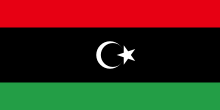Libyan nationalism
Libyan nationalism refers to the nationalism of Libyans and Libyan culture.[1] Libyan nationalism began to arise with the creation of the Senussi religious orders in the 1830s that blended North African Sufism with orthodox Islam.[1] After colonization of Libya by Italy, opponents of Italian colonial rule from Tripolitania and Cyrenaica combined forces in 1922, with Senussi leader Omar Mukhtar leading the revolt against Italian forces in Libya.[1] Libya became an independent state after World War II.[2]
Libya under Muammar Gaddafi initially pursued pan-Arabism but later abandoned this, Gaddafi initiated an irredentist war with Chad over the Aouzou strip.[2] Gaddafi was overthrown in 2011 resulting in change of state symbols including the re-adoption of the pre-Gaddafi flag of Libya.
See also[]
References[]
- ^ a b c Motyl 2001, pp. 299.
- ^ a b Motyl 2001, pp. 300.
Bibliography[]
- Motyl, Alexander J. (2001). Encyclopedia of Nationalism, Volume II. Academic Press. ISBN 0-12-227230-7.
- Libyan nationalism
